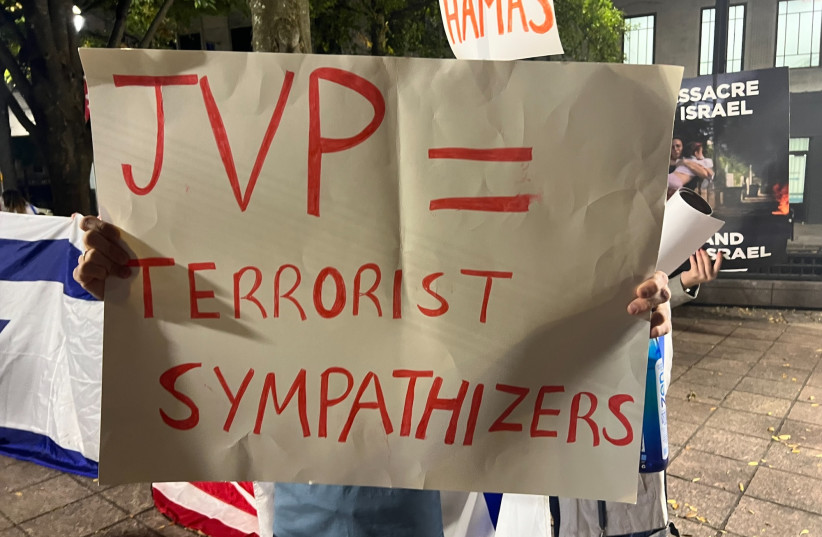(JTA) — About six weeks after its internal discord over Israel spilled into public view, Judaism’s Reconstructionist movement has issued a statement reiterating its support for progressive Zionism, the existence of Israel and the two-state solution.
The movement says the statement is a clarification of its position on Israel following the outbreak of the Israel-Hamas war on Oct. 7, rather than a change.
But the statement comes as Reconstructionist rabbis have taken leading roles in anti-Zionist activism. And it follows an op-ed in which two rabbinical students announced their withdrawal from the Reconstructionist Rabbinical College, writing that they faced harassment as supporters of Israel.
Days after that op-ed was published in the Forward, Rabbi Deborah Waxman, the college’s president, referenced the drama at its ordination ceremony and said the movement believes “Israel has a right to exist and is a vital center for Jewish life and the Jewish people”
The document published Monday by Reconstructing Judaism, a movement umbrella body, expands on that point, declaring support for Israel’s existence as well as the establishment of a Palestinian state.

It says the liberal Jewish movement supports “Securing Israel’s place in the Middle East as a Jewish and democratic state according to the vision expressed in its Declaration of Independence.”
The other principles it lists are: “Ending Israel’s military occupation of the West Bank and Gaza,” halting Israeli settlement expansion and backing Israeli-Palestinian negotiations and Palestinian statehood.
“These five principles form the core of what is often termed’progressive Zionism,’” the statement adds. “No one has ever been required to agree with all of these positions in order to be a Reconstructionist, but the movement as a whole has reaffirmed these principles many times.”
Dozens of the movement’s rabbis disagree with those positions, long uncontroversial in the Jewish mainstream but lately under attack by Jews on an emboldened far left. Reconstructionist rabbis comprise a large portion of the Rabbinical Council of Jewish Voice for Peace, an anti-Zionist group. For a decade, one of JVP’s senior leaders was Reconstructionist Rabbi Alissa Wise, and another of its rabbis, Brant Rosen, left the Chicago-area Jewish Reconstructionist Congregation and founded Tzedek Chicago, an anti-Zionist synagogue.
Wise linked this week’s statement — which she agreed was not a shift — with the movement’s rabbinical ordination ceremony in May. She said the statement was an attempt to “reaffirm their alliances with the progressive mainstream Jewish community,” much of which supports Israel.
“I think the Reconstructionist movement is getting heat for ordaining anti-Zionist rabbis,” Wise, the current lead organizer of Rabbis for Ceasefire, told JTA. “But I don’t think that anything in this current statement is new.”
Zionist history of the movement
In recent months, pro-Israel Reconstructionist rabbis have also taken steps to assert themselves, founding Beit Kaplan, a new group for rabbis like them. The group says it is guided by the teachings of Rabbi Mordechai Kaplan, the founder of Reconstructionist Judaism, who was a Zionist.
Rabbi Noah Kitty, a recently retired pulpit rabbi from Florida and a member of the group, said that she understands that in Reconstructionist Judaism, “people are not going to speak with the same voice or have the same understanding.” But she called on the movement to back up its statement on Israel by dissuading anti-Zionists from becoming Reconstructionist rabbis. (Kitty herself had left the Reconstructionist Rabbinical Association in mid-October following dissatisfaction with the movement’s response to Hamas’ attack in Israel.)
“I look less at what people say than I do at what they do, that whole ‘actions speak much louder than words,’” she said. “They and they say pretty, pretty words and nothing changes.”
She added, “What would I like to see personally? I would like to see the College actually employ a litmus test and say anti-Zionist candidates will be better served at another school.”
Rabbi Amber Powers, interim president and CEO of Reconstructing Judaism, told the Jewish Telegraphic Agency that the movement issued the statement in response to questions from its members about its positions, “which have not changed.”
She added, “We remain a diverse community that includes and values people with different views on this and many issues.”
Given that stance, Wise does not expect the movement to make support for Israel a litmus test at its rabbinical school, which she feels will raise additional questions about its core values. Another contributing factor: Multiple non-Orthodox seminaries have seen declining enrollment in recent years, and the movement may not be able to afford to shut out anti-Zionist students.
“In order for them to remain relevant and to be able to keep their lights on, they’re going to need to evolve as the Jewish community evolves,” Wise said. Regarding a litmus test, she said, “I don’t think it’ll be a sustainable strategy for them long term, and will force the question of ultimately: Are they in the business of promoting and strengthening Jewish religious and cultural life, or are they a pro-Israel organization?”
